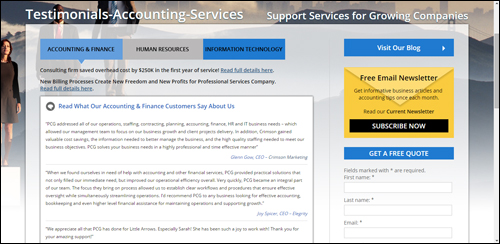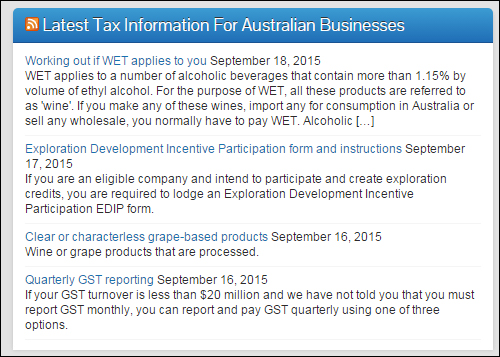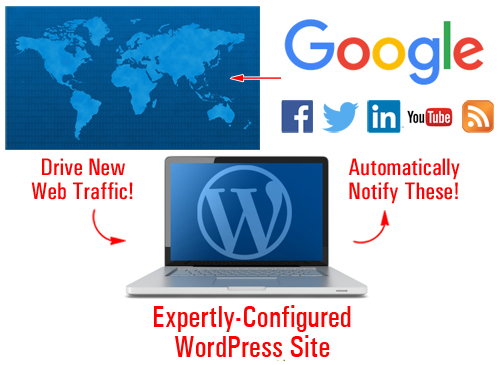Grow Your Accounting Business Online With WordPress
 The information economy has not only transformed the way business is done globally, it has also created a number of challenges and great opportunities for certified public accountants.
The information economy has not only transformed the way business is done globally, it has also created a number of challenges and great opportunities for certified public accountants.
Online Challenges For CPAs
Now, more than ever, accountants must find smarter ways to remain competitive, obtain new clients, and keep their current business. Not only do you have to maintain an active presence in the communities and industries your business serves, you must also develop an active presence online. This includes having an effective website and searching for smarter ways to market your business services online.
As well as spending dollars marketing offline, businesses in the accounting industry are now also finding that they will need to designate a more significant share of their budget to developing and maintaining a website that brings in clients, engages visitors, outperforms the competition in search engines and helps to give them a wider marketing exposure online.
This means that your site not only has to look professional, your web pages have to be fast-loading, and your website layout has to be easy to navigate, but even more importantly, your site’s needs may change in time and some areas will need to be frequently updated. This requires implementing well-developed web and content management strategy.
One other problem that accounting organizations face with their websites, as do most professions for that matter, is that you have only about thirty seconds or less to provide users what they need or they will go elsewhere.
“Websites have evolved into central information hubs where service information is still present but enhanced with web portals, hyperlinks to state and federal sites, and a variety of free tools.”
Michael Alter, http://www.accountingweb.com/technology/accounting-software/tips-for-improving-your-website
Online Opportunities For Accounting Professionals
As well as facing many new business and technology changes, there are also loads of online opportunities available for accounting firms that are willing to evolve to meet the demands of the online economy and can think progressively when it comes to improving their online marketing skills.
In this detailed guide, you will learn new ways to attract new potential clients and improve your business results online.
![]()
As well as providing general website improvement tips, we also place special emphasis on the benefits and advantages of using the WordPress content management system to power your accounting business website or blog.
For more information about the benefits and advantages of using WordPress, see the articles below:
- Discover Why A Poorly Designed Website Can Cost You Customers
- The Business Owner’s Guide To WordPress
Useful Tips For Improving Your Accounting Website
We’ll start first by reviewing some basics. In this section, we’ll look at how to improve your accounting website and get better results online. We will look at what pages a financial services site needs, what content works best for accounting websites, suggestions for improving layout and navigation, etc.
If you need website planning assistance, see this detailed step-by-step guide: A Comprehensive Guide To Website Planning For Non-Technical Business Owners
Basic Website Pages
All business websites need several essential web pages. Let’s review these.
Description Of Services
It’s essential to have a page that explains your services and products.
Your page should include services such as:
- Business – planning, formation, accounting, payroll, preparing financial statements, bookkeeping, forecasting, budgeting, financing, strategic planning, consulting services, etc.
- Taxation – preparing, planning, reviewing, auditing, advising, problem resolution
- Investment strategies
- Corporate finance
- Wealth creation
- Superannuation/retirement plan (401k) advice
- Audit risk assessment and assurance
- Quickbooks – setup, training, tune up, and support
- Specialist services – mergers, acquisitions, information technology, secretarial, rentals, trusts, fiduciary accounting, succession planning, selling businesses, transfers, etc.
- Lending and leasing
List all of the services you provide. Provide your visitors with information that will educate them about what these services do and why they should choose you.
About Us
This page needs to describe your business and explain to visitors what your business stands for, its unique approach, community projects, etc.
Remember to list any awards, certifications, recognitions, accreditations, associations, publications, etc., that you can use to promote your company and set it above the competition.

(List all of your industry awards certifications, accreditations, recognitions, publications, associations, etc. in the About page. Screenshot image sourced from: deloitte.com)
Team Profile Page
Are you searching for ideas to sell more products or services online and increase user interaction with your site? Then something you can do, is help your prospects get to know you and your organization better.
Potential clients need to relate to your business. A great way to do that is to have a page that introduces your staff members. This page should include a photo and a brief biography. Since most visitors are probably not that well-versed in accounting terms your bio descriptions should tell who they are and what their specialties are. You may also want to explain what those specialties mean. It should also include social buttons so your prospective clients can follow your team members on their social networks.
On this page, don’t be afraid to show the human side of your team members with personal stories, hobbies, etc., but make sure to outline each team member’s expertise and qualifications, why they are an asset to your team, and more importantly, how they can help add value to your clients’ business.

(Make sure to add an employee page. Screenshot image source: deepsky.com)
If you need help how to easily add an easy-to-update directory of employees to your site using free WordPress plugins, see this step-by-step tutorial: How To Easily Add A Simple Employee Directory To Your WordPress Site With No Coding Skills
Recruitment Page
List any career opportunities available within your company. This page could include type of training provided, benefits, opportunities for advancement, social activities encouraged or sponsored by your firm, etc. You should also include stories of recruits who have worked their way up in your company and information about additional career opportunities in the accounting industry.
Maintain a positions available section in your page. If there are no positions currently available, consider inviting people to return periodically to this page, subscribe to your updates list, follow your social pages, etc.
Case Studies
Case studies and reviews from clients are a great way to show potential clients what it’s like to do business with your company. Adding a web page with case studies and client reviews also provides visitors social proof.

(Add a page to your site with case studies and client reviews. Screenshot image sourced from: pcg-services.com)
We have written a comprehensive article about using client testimonials and client reviews get better results online here: How To Improve Your Sales Using Knockout Testimonials
Contact Us Page
A contact page is crucial.
It should include the following information about your firm:
- Company Name
- Your address
- Phone
- Fax number
- Map
- Website URL
- Contact form
- Request for more information – who to contact
- Social media URLs
- Live chat feature (optional)
If you have different locations you will want to make that clear when showing the address and contact information.
Consider also including a few links for commonly-asked questions, frequently-visited pages, special offers, support page, newsletter, blog, etc.
Add A Blog Section
A blog can be a very powerful business marketing tool. Many blogging platforms typically comprise of a content management system that allows you to easily promote your business using timely content such as company events, updates, useful articles and tutorials, informative posts, how-to videos, infographics, etc.
If you already have an established accounting website, then consider adding a WordPress-powered blog to promote your business.
If you don’t have a website yet, or your existing accounting or financial services site is very hard to keep updated or not giving you the results you want, then WordPress can be used both as your website and blog.
![]()
Something not many businesses know about, is that an expertly configured WordPress site can become an automated traffic system that can instantly begin driving a stream of targeted traffic to your business, simply by adding new content on a regular basis to your website.
(An expertly configured WordPress site can drive web traffic automatically to your website)
Go here to learn more: Web Site Traffic Blueprint – Discover How To Automatically Increase Your Web Visitors For Your Business
Legal Information Pages
It’s crucial for accounting companies to make sure they have a compliant website, not just for building trust and credibility with prospective clients, but also to ensure that no local, regional and federal laws or regulations are being breached in whatever area you service.
Depending on what services you provide, adding the following legal pages to your accounting or financial services site will help keep you out of trouble with most regulatory authorities, third-party service providers, and other potential sources of threats and legal inconveniences:
- Contact Page
- Privacy Statement
- Terms Of Use
- Website Disclaimer
- Affiliate Agreement
- Anti-Spam Policy
- Compensation Disclosure
- DMCA Notice
- Earnings Disclaimer
- External Linking Policy
- Health Disclaimers
- Refund Policy
- Video/Audio Terms
- and others
Go here to learn more about adding legal pages to your website: Why You Need To Add Legal Pages To Your Website
Ways To Improve The Content On Your Site
In today’s globally competitive economy, content marketing has become one of the key differentiators for businesses.
By committing to providing great content with advice and tips, you will get your readers sharing your content and coming back for more. Using content is a great way to inform and educate your visitors and prospective clients about your business.
For example, topics for an accounting or financial services business could include the following:
- Explanations of balance sheets
- Profit and loss statements
- Directors’ duties and legal responsibilities
- Presenting accounts for non-profit activities
- Cashflow planning
- Maximizing business insurance cover
- Risk protection
- Structuring a self-managed retirement fund
- Dos and don’ts of … (e.g. purchasing insurance, claiming business expenses, etc.)
You can also create a series of informative articles that will help your prospective clients understand your accounting services, such as finance accounting, tax accounting, business budgeting, reducing business debt, financial concepts made simple, etc.
Remember to use specific keywords and terminology in your content that your readers would search for online.
![]()
We recommend subscribing to our Content Marketing Email Training Series. You will receive regular training emails with easy-to-digest information and practical tips that will show you how to drive more traffic to your website or blog, save money creating high-quality content that will add value to your visitors and grow your business online using content. It’s not only a great course with loads of useful information, it’s also 100% FREE!
Improve Visitor Engagement And User Experience
Improving website user experience (often referred to as UX) helps to keep visitors coming back and engaging with your site. This section will show you different ways to improve visitor engagement and UX.
Content Syndication – RSS Feeds
RSS feeds can help to improve visitor engagement and UX in many ways.
If you provide information that adds value to others, other sites will want to syndicate your content to their visitors.
Some of the benefits of syndicating your content to other businesses using RSS feeds, include:
- All of your updates are in one place
- Content distribution doesn’t rely on email
- Can be shared online
- Users can subscribe to your feed
- An RSS feed provides a way for external links to point back to your site
- Feeds can be submitted to RSS directories and aggregator services
- RSS provides multiple ways for readers to receive your content (e.g. read the content on their mobile device using a feed reader)
- It’s built into WordPress
There are also a number of benefits when it comes to providing great information on your site from other websites, such as the fact that you don’t have to write, manage or update the content.
To find RSS feeds with useful content just search online for relevant government departments and industry bodies.
Below we have listed some useful RSS feeds you may want to consider adding to your accounting website:
- Taxation Policy Center: http://www.taxpolicycenter.org/press/rss.cfm
- Australian Taxation Office: https://www.ato.gov.au/RSS-news-feeds.aspx
- Canada Revenue Agency: http://www.cra-arc.gc.ca/rssfeeds/
- UK HM Revenue and Customs: http://www.hmrc.gov.uk/rss/rss.htm
- South Africa Revenue Service: http://www.sars.gov.za/Pages/RSS-Feeds.aspx

(Add RSS feeds to provide your visitors with a better user experience.)
Checklists And Forms
Checklists and forms are a great way to help increase user engagement and add value to your audience. Checklists and forms can give them useful instructions and resources to perform necessary tasks. They are also great business planning tools.
Forms and checklists can cover topics such as:
- How To Set Up A Company
- Negative Gearing Checklist
- Non-Profit Governance Checklist
- Disclosure Requirements
- Individual Tax Checklist
- Self Managed Super Fund Tax Checklist
- Income Tax Variation Forms
Other Tools
Providing unique tools, gadgets and applications for businesses can help increase visitor engagement and add significant value to your target audience. Calculators, such as loan and tax calculators, are useful tools for accounting websites. Others would include time cards, and retirement and interest calculators.
In the next section of this detailed article, we look at a several online tools you can use in your accounting or financial services site using WordPress plugins that can improve seo, increase user engagement and drive more web traffic to your business.

***
This is the end of section 1 of this guide on ways to improve your accounting business web presence.
To keep reading, click here:
![]()
Want To Get Automatically Notified When New Tutorials Get Published? Then Subscribe To Our Site!
***
***
"This is AMAZING! I had learnt about how to use WordPress previously, but this covers absolutely everything and more!! Incredible value! Thank you!" - Monique, Warrior Forum
***
